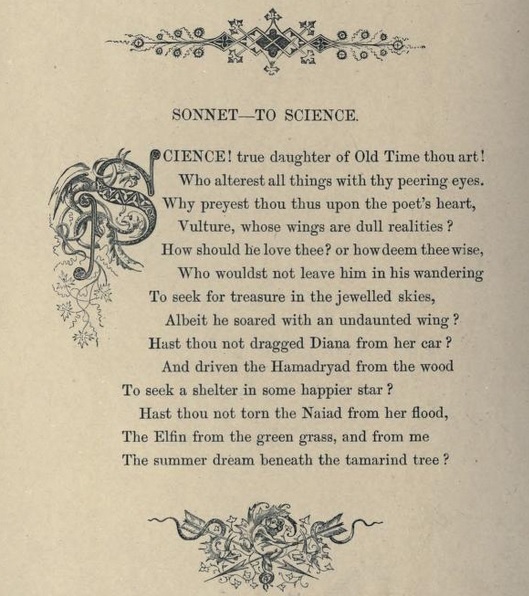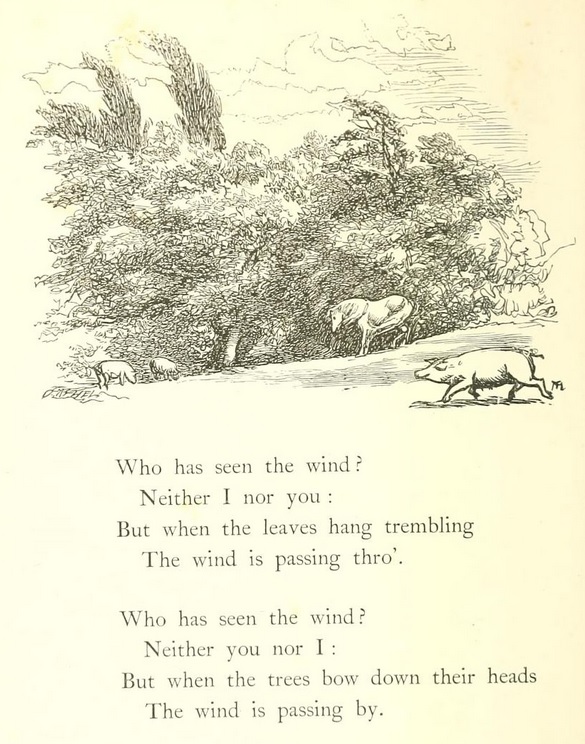TECHNICAL NOTE: The great majority of the links below are to
scanned antique books at the Internet Archive, most of them
anthologies. Poems frequently run for several pages; when coming
to the apparent end of a poem, turn the page to make sure!
"Each bar's a scientific fact."
Palgrave, William Gifford: A colourful Victorian scholar, diplomat,
explorer, and religious seeker.
"Those misled by Science: their doom is to dwell in a world such as they planned."
Canto XI follows this with an attack on British technology, "contrasted with the charm of
pure and unspoiled Nature". Canto XII condemns the railroad and the telegraph (which
broke "the bonds wisely set between nations"). Cantos XIII and XIV tell a sort of
Atlantis myth: a scientific utopia is destroyed by its own arrogance.
Patmore, Coventry:
The author of The Angel in the House
wasn't too keen on astronomy ...
Phillips, Stephen: Best known, perhaps, for his "free adaptation" of Faust, and
for his many original poems about the Great War. He was a critic of industry and "Progress", but some of
his writings are astonishingly racist, even by the lamentable standards of the early 1900s.
Against not just aircraft but technology in general.
The Doom of Sails
"Now dispossessed by the stern and stunted ironclad // Wingless and
squat and stern."
A Nightmare of London
swallowing all of England.
The Submarine
"This man-built menace of the sea."
Pike, Gen. Albert:
Best known as the leading theorist of Freemasonry, but also a pro-slavery activist (from Boston, of all places), a Confederate diplomat and (conspicuously unsuccessful) general, and a poet. In his youth he travelled around the Wild West, which looms large in his verse.
Poe, Edgar Allen:
-
Al Aaraaf Mythologises Tycho's nova.
-
Sonnet --- To Science
Famous anti-scientific screed -- and yet Poe was
a scientist in his own right, and expressed his vision of Naturphilosophie
in the "prose poem"
Eureka.
Praed, Winthrop Mackworth:
Quiller-Couch, Sir Arthur ("Q"):
Rankine, W. J. M.: The great physicist and mechanical
engineer was also a poet, essayist, and song-writer.
Rankine's complete poetical works, rather
mixed in quality. Only the ones below are on scientific/technological subjects.
The Engine-Driver to his Engine
To the tune of'The Iron Horse'.
Iron
'A geological, economical, and patriotic song.'
The Mathematician in Love Complete with equations.
The Three-Foot Rule
'A song about standards of measure' (i.e., the metric system), to the
tune of 'The Poacher'.
What Shall We Do for Coal?
Britons will muddle through. A song about the impending global energy crisis, to the tune 'Jolly Good Ale and Old'.
Rawnsley, Hardwicke Drummond:
-
John Couch Adams the discoverer of Neptune:
"In his narrow room ... he searched the
Heavens and found a world."
Reid, James D.:
-
The Mystic Wire is in the Air One of the first and
most popular of the many poems about telegraphy, apparently
meant to be sung. Reid was a professional telegrapher; the
refrain ("Four thousand miles ...") is a "found poem", a line
in an advertising brochure that Reid noticed was accidentally in
iambic metre.
Rice, Roswell:
The Atlantic Telegraph
"Long bind the Old World with the New !"
The Iron Horse
An anti-railroad poem? At least anti-railroad investment schemes.
The Magnetic Telegraph
as a metaphor for Christian salvation.
Mathematical Problem
An arithmetic puzzle.
Richards, William C.:
-
Electron a sort of epic poem about electricity.
Riley, James Whitcomb:
Once immensely popular, especially for his children's and Indiana
dialect poems.
Doc Sifers
"He's jes' a great, big, brainy man -- that's where the trouble
lays !" Riley
liked the protagonist of this short poem so well that he went on to write
a novel in verse about him,
The Rubáiyát of Doc Sifers.
The Doctor
From a Balloon
The Iron Horse
The Naturalist
To the ornithologist Oliver Davie.
The Squirt-Gun Uncle Maked Me
I guess this counts as a technology poem.
Robb, A. A.:
Roberts, Charles G. D.:
One of Canada's first major poets, although one would never guess that from the poems included here.
On the Elevated Railway at 110th Street
Robinson, Edwin Arlington:
-
The Man Against the Sky
The world is a blind rush of atoms in the void, etc.
-
Modernities
Modern science will eventually be as obsolete "as any told // In almagest or chronicle of old."
Robinson, Mary F.:
Evolution is the inchoate longing to improve.
The Stars
A subtle Victorian doubt poem with extraterrestrial life and cosmic
vastness.
Ross, Sir Ronald:
Nobel laureate for physiology or medicine (1902). Although best known for
discovering that mosquitoes are the vector of malaria, he also
conducted pioneering work
in mathematical epidemiology, and in his old age wrote a book on
Clifford algebra. He spent part of his
career in India; unlike many imperialists, he took a genuine interest
in the people and is
remembered there today as a national hero.
Very long; Ross's spiritual autobiography.
The astonishing lines that Ross composed on 1897 August 21, the day of
his greatest discovery, and later embedded in the text of In Exile.
Indian Fevers: Pure research must precede finding cures, a lesson
evidently still unlearnt 130 years later.
Man ... has mastered the universe, but not yet himself.
Science: The bold genius carries on in the face of universal scorn.
Rossetti, Christina:
Ruskin, John:
Who once told a Manchester manufacturer: "No Florentine would
have endured the sight of any smoke or blackness in his city, or
near it, for half-an-hour ... Use the sun, the wind, and the rain.
And, under certain limited needs, you may light fire, or use a
fan, or distil water. But to live by Fire is diabolical."
Meteorology was something of a fad in the 1830s, and young Ruskin
participated.
The Steam Engine
(In the footnote.) Ruskin's first poem, written as a child.


